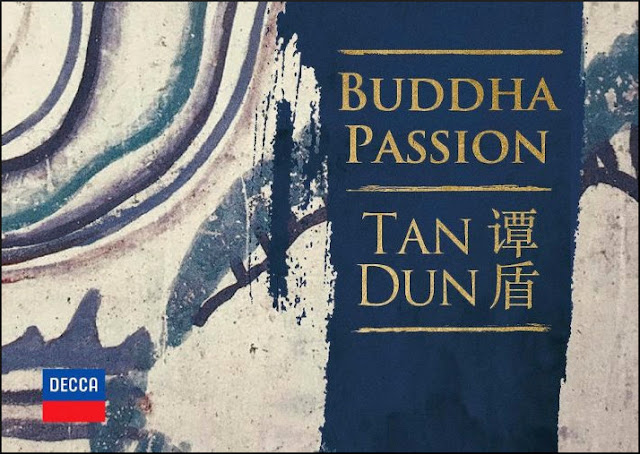Crouching composer, hidden dragon
My post describing how classical music has many Buddhist tendencies continues to reach a gratifyingly wide audience. So it is now time to confront the elephant in the shrine room - Tan Dun's Buddha Passion. Tan Dun is best-known for his soundtrack for Ang Lee's movie Crouching Tiger, Hidden Dragon, which was recorded at the Shanghai Radio, Film And TV Bureau Technical Center in 1999. Born in 1957 in the central Chinese district of Hunan, the son of a military officer in the People's Liberation Army, Tan Dun studied at the Central Conservatory of Music in Beijing. In 1986 he moved to New York City but retained strong links with China. His Symphony 1997 was commissioned for the reunification of Hong Kong, he is a regular guest conductor in China, and in January 2024 the Buddha Passion was performed under his direction in Macao to celebrate the 75th anniversary of the founding of the People's Republic of China
The Buddha Passion was inspired by Tan Dun's visit to the ancient Mogao Caves, a major tourist attraction in north-west China. This UNESCO Heritage Site is the largest, oldest , and most valuable reliquary of Buddhist art in the world. Unlike the 6000 monasteries destroyed in Tibet, the Mogao Caves escaped the People's Liberation Army purges of the 1960s. In typical gushing PR speak Decca describe the Buddha Passion as "an epic choral work... a captivating tale of wonder, truth and gentle but irresistible transformation... the first such ‘Passion’ on a Buddhist rather than Christian narrative". Released on CD in 2023, the Buddha Passion was recorded with the Orchestre National de Lyon, chorus and soloists conducted by the composer at the Shanghai Oriental Art Centre with the participation of Hunan Broadcasting System, China's second biggest state-owned broadcasting network.
The irony of a 'Passion' on a Buddhist narrative with the full-on participation of China hardly needs reprising. Tan Dun's Buddha Passion purports to be "a captivating tale... of irresistible transformation" inspired by the Buddhist wisdom tradition. Yet more than a million Tibetans have died as a result of the Chinese invasion of Tibet in 1950. As well as the destruction of almost every monastery and the loss of irreplaceable art and manuscripts, Chinese exploitation of Tibet's natural resources has resulted in the deforestation of almost 50% of the region's natural resources. In turn this loss of habitats has devastated wildlife. Hardly what can be termed "irresistible transformation".
Following Mao's death in 1976 and the appointment of the relatively liberal Hu Yaobang Bejiing's policy towards Tibet moderated. Which simply means torture, rape and killings came off the agenda, and human genocide was replaced by cultural genocide. The main thrust of this strategy has been the enforced migration of Han Chinese into the Tibet Autonomous Region. As a result the population of Lhasa grew by more than 50% between 2010 and 2020, with Han Chinese now comprising more than 20% of the city's population. In another example of "irresistible transformation", in 2021 Tibet's first McDonalds opened in a shopping centre opposite the Potala Palace, the Dalai Lama’s former residence.
Buddha Passion is another example of the culture-washing that the classical industry and media so enthusiastically support. Predictably reviews echoing Decca's PR-speak use headlines such as "Tan Dun’s message of love and compassion" - Guardian, "An immense work that straddles East and West" - The Standard, and "An attractive work, instantly and uncomplicatedly gratifying" - Gramophone. Leaving aside all the unfortunate political baggage, sadly the music of Tan Dun's Buddha Passion rarely rises above the level of an Andrew Lloyd Webber musical. Among the few critics who did not toe the party line were Marc Bridle at Opera Now who described it as "A flawed work which isn't all it seems" and Christopher Woodley at Bachtrack who reported "Tan Dun's Buddha Passion fails to provide enlightenment... Alas, the hype outdistanced the reality by very many leagues".
Not one reviewer questioned the hidden Chinese dragon behind the Buddha Passion. Not one reviewer questioned Tan Dun's setting of the Heart Sutra in the penultimate act, a text held by the Dalai Lama to be one of the core teachings of Buddhism. In 2021 Radio Free Asia reported that Chinese authorities in Sichuan’s Kardze prefecture had launched a new drive against the display by Tibetans of photos of the Dalai Lama. Needless to say, despite his revered position as a Nobel Laureate and preeminent Buddhist, despite his espousal of the Heart Sutra and despite its setting by Tan Dun, neither the Dalai Lama's photo or name appear on any of the recording documentation or publicity material. Similarly, there is not a single image of a Buddha rūpa (statue) in any of the material, despite the work's alleged Buddhist narrative. Coincidentally the Central Communist Party has a policy of eliminating Buddhist icons across China.
Decca's owner Universal Music Group is one of many Western music companies operating in China. The music streaming market in China is worth more than 2 billion US dollars. Which is far more important to today's classical music industry than "wonder", "truth" and one million dead Tibetans.










Comments